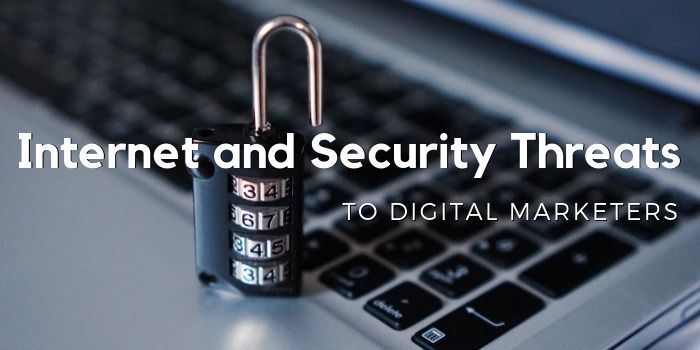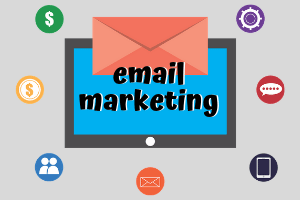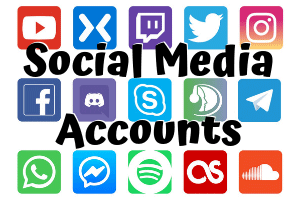We all know the online business world today is fraught with cybersecurity threats and risks, but what do internet and security threats really mean to digital marketers and home business owners?
A lot of huge multimillion-dollar corporations have lost millions to unscrupulous hackers who steal information, revenue and other important content from protected websites. If huge corporations with the most powerful firewalls and the most qualified internet security experts have been targeted and affected by cyber-criminals, then it shows that the average budding online business is not safe from the scourge of these terrible cyber-criminals too.

Whether you are a new or established digital marketer, you should really understand the threats that your website is prone to, and how to effectively protect your online business from the menace of unethical hackers. Today I will explain three of the main web security threats that business owners may face.
#1 Attacks on CMS and Web Hosting Environment

Most digital marketers use established content management systems (CMS's) to manage and deliver valuable and relevant content to their viewers on their websites. A simple form of CMS is a website builder, and the most used website builders include WordPress, Drupal and Joomla. And the system is hosted and managed by a web hosting service, making it accessible by users across the world.
More complexed content management systems exist, helping to provide a platform for people to access your digital marketing content in various ways, and they provide the avenue to fulfill your clients’ wishes of promoting their brands effectively and increasing sales and profits.
Cybercriminals, over the years, have however, learnt to take advantage of loopholes present in security features of the web hosting service and CMS to illegally obtain confidential information like data related to a digital marketer’s customer base. This information may be used for other unscrupulous purposes such as perpetrating fraud and scams. Loss and exposure of sensitive data may also occur because of attacks like Distributed denial-of-service commonly referred to as DDoS. These attacks could possibly damage essential system infrastructure, causing permanent loss of information and plunges in revenue figures.
To protect your system from attacks targeted at your website data and hosting environment as a digital marketer, it is important for you to regularly take a backup of your data. Also to make sure that your web hosting company updates their system to take advantage of newer and more sophisticated security features. These updates are usually created in response to customer demands, hence it is very likely that up-to-date software would offer the necessary protection you need from threats and security risks.
As a digital marketer, you should also endeavor to carry out routine security procedures to protect your content management system and the information it contains. This means that you should regulate and directly oversee the registration of user accounts and ensure the installation and presence of external security software like firewalls. You must also reinforce password protection policies available on your website to prevent unpermitted access, and make sure that your CMS is only accessed via a secure network to prevent remote data theft.
#2 Attacks On Email Marketing Systems

As more brands and companies continue to use email marketing services as a means of getting information about their products and services out to their loyal customers who have signed up to receive such mails, unscrupulous hackers have also evolved to develop even more sophisticated means of gaining access to confidential information through email marketing systems.
The technique of infiltrating an email marketing system to steal information about customers and the company is called phishing. Most email marketing systems have been fortified to withstand phishing attacks, but customers who receive mails remain the weakest link in the email marketing system, hence, most hackers usually trick unsuspecting customers into submitting their confidential information.
Once such information has been obtained, the hacker can proceed to launch an attack on the email marketing system, causing unprecedented attacks and loss of information. To help protect your email marketing system from phishers, you need to make sure that the security features of your email security system is up-to-date and well installed.
If you are using an established reputable email marketing service, there is not so much to worry about. But you should be aware of the threats if you are using a service by relatively unknown company or a self-hosting service. To prevent remote attacks, sensitize your mail receivers on the importance of keeping their confidential information off the hands of unscrupulous hackers. It is also recommended to review your internet service provider and server security features to ensure functionality. You can also employ the use of encryption tools to help encode the emails you’ll be sending out to your customers to prevent phishing.
#3 Attacks On Social Media Accounts

Social media has evolved over the years, since the creation of Facebook to become the most effective method of digital marketing in the world. Billions of individuals spend hours on their social media accounts every day, surfing through different kinds of contents, watching videos, exchanging messages with their contacts and of course, reading information about brands.
Social media channels also provide a brilliant platform for customers to meet their brand representatives and seek clarification or help concerning a product or service of the brand that the customer is having problems with. The vast marketing and customer-service applications of social media accounts owned by businesses and managed by digital marketing experts make these social media accounts high-priority targets for hackers.
One of the most important means by which hackers gain access to a brand’s social media account is through a phishing link. A fake offer might be posted, and an unsuspecting individual could attempt to log in to his social media account through the phishing link to take advantage of the offer. From there, confidential information like passwords are stolen, and the hackers gain access to social media accounts.
To prevent loss of information and illegal misrepresentation leading to frauds and scams through hacking of social media accounts, digital marketing brands need to log in to social media accounts only through officially recognized channels. Again, most of the social networks maintain the highest level of security prevention systems, assuring us the safety of use. But still, as a digital marketer you should monitor all your social media activities to prevent any costly mistakes, i.e. loss of reputation damaged by third parties. Stringent privacy settings should be activated to help protect the integrity of the social media account.
Internet and Security Threats to Digital Marketers
Three of the most important threats and risks faced online by digital marketers have been discussed and means through which these risks can be reduced have also been provided. As a digital marketer, endeavor to always install necessary up-to-date security software and be careful about suspicious links to protect your precious information and that of your clients and their customers.


